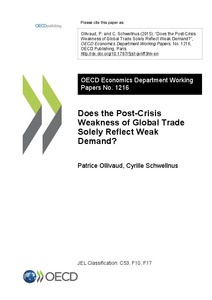Does the post-crisis weakness of global trade solely reflect weak demand?
"Global trade growth over the past few years has appeared extraordinarily weak, even in relation to weak global GDP growth. This paper shows that the apparent breakdown in the relationship between global trade and global GDP growth is largely explained by two factors: an inappropriate measureme...
| Main Authors: | , |
|---|---|
| Institution: | ETUI-European Trade Union Institute |
| Format: | TEXT |
| Language: | English |
| Published: |
Paris
2015
OECD |
| Subjects: | |
| Online Access: | https://www.labourline.org/KENTIKA-19112755124919309379-Does-the-post-crisis-weakness-.htm |
| _version_ | 1771659899081588736 |
|---|---|
| author | Ollivaud, Patrice Schwellnuss, Cyrille |
| author_facet | Ollivaud, Patrice Schwellnuss, Cyrille |
| collection | Library items |
| description | "Global trade growth over the past few years has appeared extraordinarily weak, even in relation to weak global GDP growth. This paper shows that the apparent breakdown in the relationship between global trade and global GDP growth is largely explained by two factors: an inappropriate measurement of global GDP and extraordinary demand weakness in the euro area. As a measure of demand for traded goods, global GDP at market exchange rates is more appropriate than the conventional purchasing power parity-based measure. Moreover, extraordinary demand weakness in the euro area – which is a particularly trade intensive region – has had a substantial negative effect on intra-euro area trade flows, which are commonly counted towards global trade. When global GDP is measured at market exchange rates and intra-euro area flows are removed from the measure of global trade, econometric estimations suggest that over the past 15 years the long-term elasticity of global trade to GDP has been similar to that of the 1990s. Indeed, the overwhelming part of post-crisis trade weakness can be attributed to weak global demand rather than structural changes, according to the econometric estimations in this paper and supporting evidence on changes in global investment, international production fragmentation and protectionism." |
| format | TEXT |
| id | 19112755124919309379_d79d3c0daf074439a0c67c82a04b8a57 |
| institution | ETUI-European Trade Union Institute |
| is_hierarchy_id | 19112755124919309379_d79d3c0daf074439a0c67c82a04b8a57 |
| is_hierarchy_title | Does the post-crisis weakness of global trade solely reflect weak demand? |
| language | English |
| physical | 38 p. Digital |
| publishDate | 2015 |
| publisher | Paris OECD |
| spellingShingle | Ollivaud, Patrice Schwellnuss, Cyrille economic growth forecast gross domestic product trade Does the post-crisis weakness of global trade solely reflect weak demand? |
| thumbnail | https://www.labourline.org/Image_prev.jpg?Archive=108000292628 |
| title | Does the post-crisis weakness of global trade solely reflect weak demand? |
| topic | economic growth forecast gross domestic product trade |
| url | https://www.labourline.org/KENTIKA-19112755124919309379-Does-the-post-crisis-weakness-.htm |

